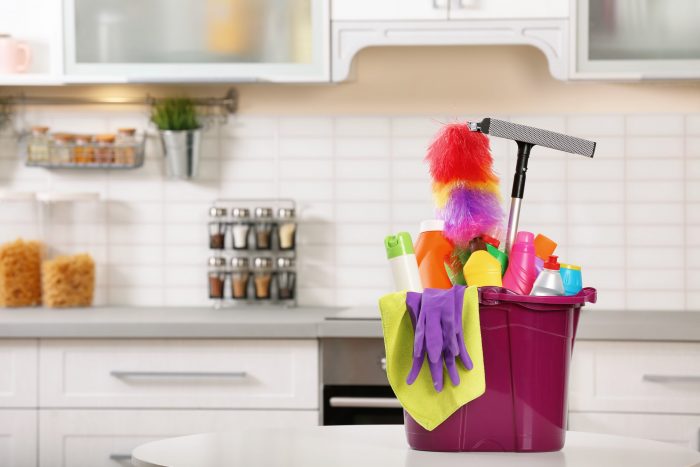Vacation Rental Cleaning Contract: All the Small Print You Need to Know

Whether you have a one-time job or need regular cleanings, it is key that you have a vacation rental cleaning contract in place before you start working with a new cleaner or cleaning company. Not only will it offer extra protection to all parties and property, but it’s also a useful channel for communicating expectations and standards.
Considering that cleanliness is a dealbreaker to guests, it makes sense to draw up a contract so that everything is right from the start. It’s definitely one area where you don’t want to cut corners (or skip, for that matter).
Read on to find out more about what to include in your agreement and how to protect yourself, your property, and your business.
What Is a Vacation Rental Cleaning Contract?
In short, a vacation rental cleaning contract is a legally binding agreement that gets signed between the cleaning service/company and the short-term rental business or host that makes use of their services in exchange for payment. Not only is it used for legal protection, but it also describes the relationship between all the parties involved and the specific details of the job. It will also mention the procedure that needs to be followed if any of the parties wishes to end the contract.

Why Should You Use a Vacation Rental Cleaning Contract?
Vacation rental cleaning contracts are designed to protect you, your cleaner, and the property. It can also help to keep the communication lines open and ensure that everyone is on the same page about the job at hand. Check out the key benefits that a cleaning contract brings to both parties:
-
Clear communication between you and a cleaning team
As guest expectations are higher, vacation rental cleaning is different from other types of cleanings. So, as a host, you will have specific expectations about what the job will entail. In addition to outlining basic details with regards to the cleaning job, the contract gives the opportunity to highlight any special requests. You can, for example, include a vacation rental cleaning checklist to help provide clearer instructions.
Hosts and property managers are not the only ones with expectations. The cleaning company will also have their expectations, such as if the equipment should be supplied by the client. Therefore, this needs to be clarified beforehand. Plus, it also gives the service provider the chance to describe the type of tasks that they’re trained or willing to complete.
-
Property protection
Accidents are bound to happen, especially if you need to move furniture around. Even if you have insurance in place (which you definitely should), by having a contract in place, you can rest assured knowing that all your bases have also been covered.
-
Easier dispute resolution
In the unfortunate event of a dispute, a contract can be a useful resource. It is easy to forget what was agreed upon, and as the contract is a written record, the parties will then be able to refer back to it. Also, some contracts might even describe which course of action the parties need to take if there is a dispute.
What Should a Cleaning Contract Include?
1. Details about the cleaning service/company and the client
At the top of the vacation rental cleaning contract, you should specify the key details about you and the cleaner or cleaning company — your name and the name of the cleaning company, address, and business hours. It is also essential to specify the contact information of both parties, including emergency contacts.
2. Type of services provided
In this section, you should list the exact agreed-upon services. It is important that you’re as specific as possible.
To avoid any confusion, it can also be good practice to explain the differences between various types of cleanings. For example, there is a difference between a turnover and a deep clean. Some contracts also include which services the cleaner won’t carry out just to make double sure that both parties are in complete agreement.
3. Cleaning standards
A host may add a Standard Property Appearance document to avoid disputes on how the property should look after cleaning. In short, this document will show exactly to cleaners what the property must look like after they have completed their job.
It can be useful to incorporate photographs of where items must be placed and can even be used to offer more information about specific details like how towels must be folded. By providing as much information as possible, you will ultimately make the job easier for your cleaners (and not the other way around).
4. Cleaning schedule and location of the services
Will the cleaning be weekly, biweekly, or as a once-off project? Who will be responsible for scheduling the cleaning times? If there is a change to the schedule, by when should the cleaning company or host be notified? These are all examples of questions that this section should give answers to.
5. Automation and accepting cleaning jobs
You will also need to specify how cleaning jobs will be assigned and accepted. Usually, this is the responsibility of the host. Given that hosts already have a long list of responsibilities that need their attention, it is best to indicate in the contract that the cleaning company will have to adopt the software that the host uses.
For example, vacation rental software like iGMS can streamline the cleaning process for both hosts and cleaning staff. With the iGMS, you can:
- Share daily cleaning schedules with your cleaners
- Create unique cleaning checklists for a specific short-term rental
- Auto-assign cleaners to your properties
- Track the status of each cleaning task
- Notify your cleaning team of last-minute changes by pinning to-do notes at the top of your guest requirements list.
In addition to streamlining the cleaning routine, iGMS is also useful for simplifying other operations such as managing multiple accounts, automating guest messaging, and creating essential reports.
6. Equipment and types of supplies

Who will provide the equipment like a vacuum cleaner? Will it be the client or the service provider? The same applies to the supplies such as sponges, scrub pads, disinfectants, etc.
In most cases, it will be the cleaning company that will provide most of the cleaning supplies. They most likely already have their own preferred products that they know how to use. Though, heavier equipment, like a vacuum cleaner, will typically be supplied by the host.
7. Responsibilities of parties
In order for the cleaning team to be able to deliver their service, the host will have some responsibilities. These can include responding to requests within a timely manner, making sure the team can access the property, ensuring the property is safe, etc. Responsibilities of the cleaner will include informing the client before the date of the requested service if they have to cancel, bringing their own supplies, following the checklist, etc.
8. Cleaning costs and fees
Here, you will need to decide on a pricing structure. Will it be per hour or per property? Factors to consider will include the size of the property, the number of bedrooms and bathrooms, and if any extra services are required.
It might be necessary to add a clause about if a rate can be re-assessed based on the scope of the project or time required. For example, the cleaning service provider might insist on price adjustments or extra charges if the property is extremely dirty. Also, will there be any cancellation fees, late payment fees, and extra requests fees?
9. Payment details
This section should include information about payment details, such as the dates on which payments will be made. It is also a good idea to create a deadline for when the cleaning company should send you the invoices.
10. Force Majeure
While it might be a new term to you, force majeure is a common clause in contracts. To put it simply, it frees both the host and cleaner from obligation or liability when there’s an event beyond their control, like a pandemic, that prevents them from fulfilling their obligations. For both parties’ protection, it’s best practice to include such a clause that will relieve parties from their obligations under certain conditions.
11. Disputes
Your agreement should also explain what steps should be followed if there is an issue with a complaint. Does it need to be addressed in writing? What will the process be if a guest complains about cleanliness? Or, what if a cleaner forgets to replenish an item?
12. Contract termination
This section should include the notice period, the reasons for which notice may be given, and in which format it will be accepted. For example, will it be a 30-days written notice on either side? Also, what will happen if there are any outstanding payments?
13. Signatures of both parties
For it to be a legally binding contract, both parties must sign the agreement.

14. Addendums:
To make the contract even more comprehensive, you can also include additional documents such as a Standard Property Appearance and Vacation Rental Cleaning Checklist.
-
Appendix A – Standard Property Appearance
The Standard Property Appearance explains in detail what the property must look like after the cleaning. It will outline the following:
- Where the remote controls will be placed
- If the curtains must be closed
- How the beds should be made
- How the towels should be placed
- How and where other amenities should be placed
- If the lights must be switched on
- The temperature setting.
It will help to ensure that the quality of the cleaning will remain consistent from one booking to the next. The more details provided, the better! You can even include photographs to illustrate your explanations.
-
Appendix B – Vacation Rental Cleaning Checklist
The benefit of a vacation rental cleaning checklist is that it helps to avoid any misunderstanding between the host and the cleaning team. There are different types of checklists that can be used: a light cleaning checklist, deep cleaning checklist, turnover cleaning checklist, touchup cleaning checklist, etc. Generally, these checklists will be per room to ensure nothing gets overlooked.
How to Write a Vacation Rental Cleaning Contract?
All in all, a vacation rental cleaning contract is straightforward to create and change if needed. You can write it from scratch, use a template that is available online, or hire an expert to create a contract for you. Whichever approach you follow, a lawyer that specializes in these types of contracts should do the final review of the contract.
About the Author
Olga Vasylieva is the Content and Social Media Team Lead at iGMS. Olga is on a mission to help hosts and property managers grow their businesses and deliver an excellent guest experience. She is a travel enthusiast and is inspired by life in all its aspects.





![Your Monthly iGMS Roundup [February 2020]](/content/images/size/w600/wordpress/2020/02/igms-roundup-feb-2020-cover.png)

